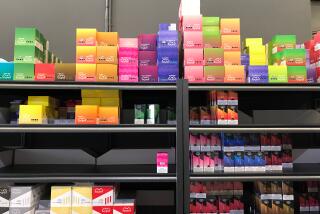R.J. Reynolds Faces New U.S. Hearing in EU Case
- Share via
The U.S. Supreme Court breathed new life Monday into a European Union lawsuit that accuses R.J. Reynolds Co. of smuggling cigarettes to avoid paying potentially billions of dollars in taxes, fees and customs duties.
The justices, citing their decision last week in a case raising similar issues, on Monday told a federal appeals court to revisit its conclusion that U.S. judges lack jurisdiction to consider the EU claims.
The justices also told the lower court to reconsider a related bid by 25 Colombian departments, equivalent to U.S. states, to sue units of British American Tobacco and other cigarette makers.
R.J. Reynolds spokesman Seth Moskowitz said the appeals court “should uphold its prior conclusion because that conclusion is consistent with the reasoning the Supreme Court used in the case it cites.”
The high court action comes in a multi-pronged battle that prompted Altria Group Inc.’s Philip Morris to reach a $1.25-billion settlement with the EU last year. The EU also is pressing a separate U.S. lawsuit accusing R.J. Reynolds of money laundering.
The EU and 10 of its member states accuse the tobacco companies of operating a global scheme to illegally import cigarettes into Europe using drug traffickers around the world. The companies allegedly set up special accounts in Panama and Switzerland to launder the proceeds.
R.J. Reynolds “actively established smuggling routes, sought out smuggling customers and developed the smuggling scheme” in Europe, the EU and the Colombian departments argued in a court filing in Washington.
The Colombian complaint says tobacco companies, particularly BAT and its former Brown & Williamson unit, ran a similar system to sneak cigarettes into that country. BAT last year sold Brown & Williamson to Reynolds American Inc., the Winston-Salem, N.C.-based parent of R.J. Reynolds Tobacco.
In throwing out the EU and Colombian lawsuits, the New York-based U.S. 2nd Circuit Court of Appeals pointed to the so-called revenue rule, a U.S. legal principle that bars suits by foreign governments seeking to collect unpaid taxes.
“That ruling is consistent with more than 200 years of case law from around the world and with every state and federal decision in this country,” the tobacco companies said in a filing that urged the Supreme Court not to hear the case.
The Supreme Court on April 26 rejected arguments that the revenue rule barred U.S. prosecution of three men who smuggled liquor into Canada to avoid paying taxes in that country. In reviving the tobacco cases, the high court told the 2nd Circuit to consider the effect of the liquor ruling.
More to Read
Inside the business of entertainment
The Wide Shot brings you news, analysis and insights on everything from streaming wars to production — and what it all means for the future.
You may occasionally receive promotional content from the Los Angeles Times.










